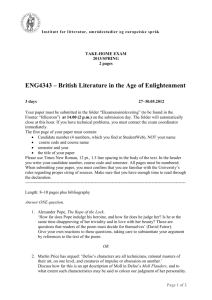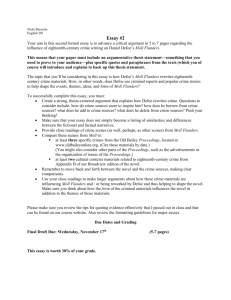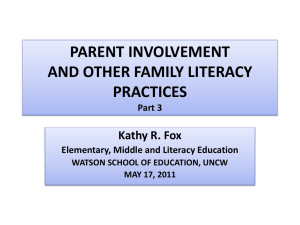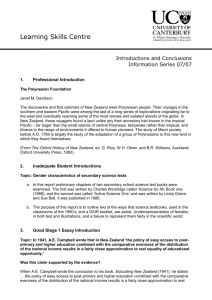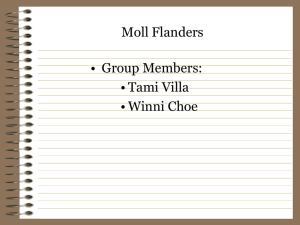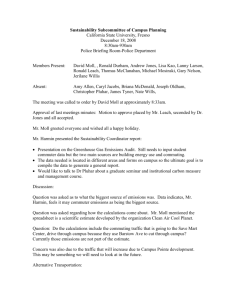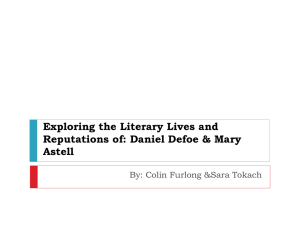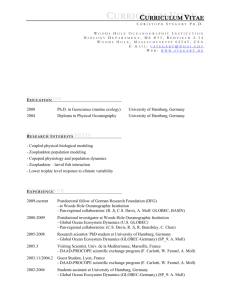Stiahnuť prednášku
advertisement
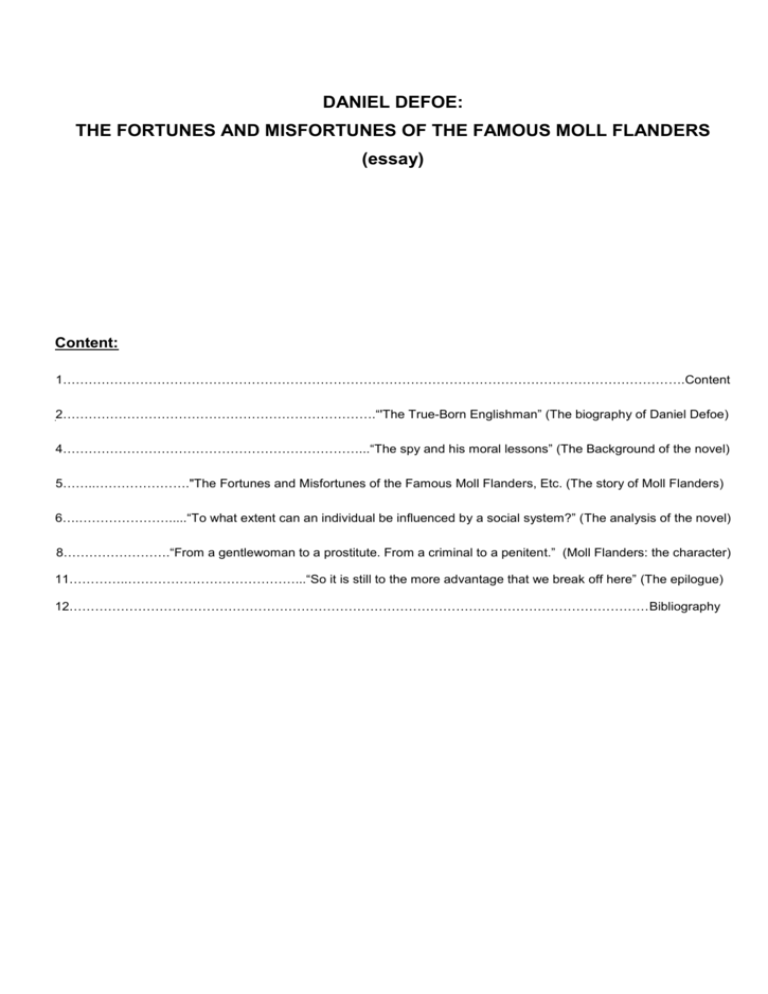
DANIEL DEFOE: THE FORTUNES AND MISFORTUNES OF THE FAMOUS MOLL FLANDERS (essay) Content: 1……………………………………………………………………………………………………………………………….Content 2……………………………………………………………….“'The True-Born Englishman” (The biography of Daniel Defoe) 4……………………………………………………………...“The spy and his moral lessons” (The Background of the novel) 5……..…………………."The Fortunes and Misfortunes of the Famous Moll Flanders, Etc. (The story of Moll Flanders) 6….………………….....“To what extent can an individual be influenced by a social system?” (The analysis of the novel) 8…………………….“From a gentlewoman to a prostitute. From a criminal to a penitent.” (Moll Flanders: the character) 11…………..…………………………………...“So it is still to the more advantage that we break off here” (The epilogue) 12………………………………………………………………………………………………………………………Bibliography “'The True-Born Englishman” (The biography of Daniel Defoe) Born in London in 1660 to a tallow chandler, Daniel Foe (to alter his name to the more genteel Defoe around 1695) is perhaps now best known for his fiction The Strange Surprising Adventures of Robinson Crusoe from 1722 /5, pg.81/. In his own time, however, Defoe did not put his name to his fictions and by the time Robinson Crusoe was written, Defoe, aged 59, had been a merchant, following in his father's footprints, a journalist, centre of controversy with his satirical pamphlet The Quickest Way With Dissenters (1702), for which he was arrested the following year, and a secret agent /2, pg.2/ (working 11 years for government Tory minister Robert Harley). Defoe's fiction evidently takes elements of these life experiences: the propensity for role-playing, the determined realism that characterises his writing, the economics and obsession with meticulously recording monetary gains and losses. By the time Defoe was ten, he had lived through the Plague and the Great Fire of London /5, pg.81/. Yet, the event which arguably had the most sustained effect on his life and writings was the conversion of his family in 1662 to Nonconformism: Protestant Dissenters from the Church of England. This took place in 1662, as the family followed their pastor, Samuel Annesley and Defoe's family background was thus as a part of a persecuted minority. Defoe attended the Charles Morton Academy from cca.1674-79. Nurturing a tolerant attitude towards philosophy and literature, the Academy encouraged freedom of inquiry and self-discipline. Thus Defoe's education included nonstandard subjects, such as history, modern languages and physics, as well as listing for reading works such as Locke's An Essay on Human Understanding, a work banned at Oxford /7/. Having completed four of the five years expected of candidates for the ministry at the Morton Academy, Defoe made began to think about his future, weighing the retired and necessarily secretive life of the Dissenting clergy against the excitement of his father's life. Around the same time he became acquainted with Mary Tuffley, whom he was marry to in 1684 /2, pg.1/ and had two sons and five daughters. Two years after his marriage, Defoe made the decision to go into trade, a profession he followed for about ten years. In this time, Defoe did not lead a quiet life: he served in the Duke of Monmouth's Rebellion in 1685, fighting for a Protestant successor to the throne rather than the Catholic James II. The rebellion did not last long, but it is surprising that Defoe returned and remained untouched by repercussions and uncaptured. He stayed with his family and business, becoming a member of the Butchers' Company in 1687 and thus a freeman of the City. It was in 1688 that Defoe wrote first major political tract A Letter to a Dissenter from His Friend at the Hague, concerning the Penal Laws and the Test in which he took on the role of a Dutchman criticising motives behind King James's 2nd declaration of Indulgence in April 1688. Not only does this illustrate Defoe's profound distrust of Catholics, but it shows the beginnings of his satirical writing (Holland was an example held up by King James of a country in which the religious tolerance that he sought was successful) and his use of persona, taking on a fictional voice for the sake of presenting a serious argument or moral. By 1689, Defoe's troubles had begun. His daughter had died the previous year and his father in law in 1686, leaving financial decisions to Defoe. Despite personal loss, his self-presentation as a businessman made him continue to appear successful. In fact financial problems had already 1 begun to surface. Problems with shipping, at times a too trusting nature, and carelessness with records and accounts eventually led to his imprisonment for debt to the sum of £17,000 in 1692 /7/. Upon leaving the prison, the company kept by Defoe led him to become associated with the booksellers trade. Various works, including an elegy written on the death of Samuel Annesley were written by Defoe in the same year as his first book, An Essay upon Projects, published in 1697. Over the next few years, Defoe became well known in London for his pamphlets and poetry, until by the end of 1701 he was in the position of making money and being known for his writing. It was during these years to 1713 that Defoe wrote and produced The Review, a pro-government paper /2, pg.1/. Defoe began writing fiction relatively late in life, around the age of sixty. He published his first novel, Robinson Crusoe, in 1719, attracting a large middle-class readership. He followed in 1722 with Moll Flanders, the story of a tough, streetwise heroine whose fortunes rise and fall dramatically. Both works straddle the border between journalism and fiction. Defoe’s other main works, A Journal of the Plague Year and Roxana, followed shortly after. Robinson Crusoe was based on the true adventure story /5, pg.85/ of a shipwrecked seaman named Alexander Selkirk and was passed off as history, while Moll Flanders included dark prison scenes drawn from Defoe’s own experiences in Newgate and interviews with prisoners. His focus on the actual conditions of everyday life and avoidance of the courtly and the heroic made Defoe a revolutionary in English literature and helped define the new genre of the novel. Stylistically, Defoe was a great innovator. Dispensing with the ornate style associated with the upper classes, Defoe used the simple, direct, fact-based style of the middle classes, which became the new standard for the English novel. With Robinson Crusoe’s theme of solitary human existence, Defoe paved the way for the central modern theme of alienation and isolation. Daniel Defoe was a prolific writer who would turn his hand to almost any topic; he has been called one of the greatest journalists and the father of journalism. He wrote over five hundred books, pamphlets and journals on a wide range of topics including politics, crime, religion, geography, marriage, psychology and the supernatural. Throughout his life he delighted in role-playing and disguise, using it to great effect as a spy, and in his writing he often adopted a pseudonym or another personality for rhetorical effect. To many of his contemporaries, he was a man who sold his pen to the political party in office and so lacking integrity. He was not taken seriously by literary men, though his skill at writing was acknowledged. Some mid-19th century readers were shocked by the language and content of Moll Flanders and other novels with rogues as the main character. Despite these negative reactions, by 1860 the number of books and essays about him increased dramatically, and he was on the way to being acknowledged as one of the great eighteenth century writers. He received widespread and consistent serious critical attention in the twentieth century, and his works have been subjected to modern interpretations. Daniel Defoe died in London on April 24, 1731 and was buried at Bunhill Fields in London /2, pg.2/. 2 “The spy and his moral lessons” L(The background of the novel) Defoe wrote Moll Flanders as picaresque first-person narration of the fall and eventual redemption of a lone woman in 17th century England. She appears as a whore, bigamist and thief, lives in The Mint, commits adultery and incest, yet manages to keep the reader's sympathy. Both this work and Roxana: The Fortunate Mistress (published in 1724) offer remarkable examples of the way in which Defoe seems to inhabit his fictional (yet "drawn from life") characters, not least in that they are women. In Roxana, Defoe returned to the subject of fallen women /8/. The life of Moll Cutpurse, who is mentioned in the book, undoubtedly inspired Defoe although she is quite a different character to Moll Flanders. Defoe himself was a noted Puritan. His views are unambiguous, in that he believes and writes for hard work, devotion, and the work of providence as grace. There is some debate, however, as to whether Defoe intended Moll as an entirely sympathetic character. The novel, devoting many pages to crime and sin and very few to repentance or even remorse, leads the reader to question Moll's desire for forgiveness. She is therefore an ambivalent character. These arguments often allude to Defoe's preface, in which he mentions "lewd ideas" and "immodest terms" that could lead the audience to read the work for scandalous entertainment instead of moral value /8/. The novel combines Defoe's interests in conversion narratives with his experience and interest in crime. Moll Flanders was a popular novel, and Defoe's reputation was aided by it. He had earlier written about criminals for various journals, and Moll Flanders increased his reputation as a writer of criminal life /6, pg.95/. From the point of view of historians, Moll Flanders is valuable for its information on the life, punishment, and habits of the criminal world. In addition to being one of the few detailed descriptions of life in The Mint, it is also one of the best narratives of life in Newgate prison, the punishments of and the way that America was viewed in the early 18th century. The novel is itself a bit of pro-immigration propaganda /6, pg.121/, in that it portrays America as a place of peace, religious tolerance and opportunity. 3 "The Fortunes and Misfortunes of the Famous Moll Flanders, Etc. Who was born in Newgate, and during a life of continu'd Variety for Threescore Years, besides her Childhood, was Twelve Year a Whore, five times a Wife (whereof once to her own brother), Twelve Year a Thief, Eight Year a Transported Felon in Virginia, at last grew Rich, liv'd Honest and died a Penitent. Written from her own Memorandums." (The story of Moll Flanders) Moll Flanders first appeared in 1722. Its lengthy title page gives an apt summary of the plot and highlighted the scandalous and amoral life of Moll Flanders, Defoe’s most notorious heroine, claiming it to be written in the form of her memoirs /2, pg.2/ but still it is the author’s fiction. The book is divided into two main sections – the author’s Preface and the story itself. The whole main plot is not divided into any parts; it is just a narration of events in Moll’s life told in temporal order. It is written in the form of a fictional autobiography of the girl known as Moll Flanders whose mother was convicted of petty theft just before her birth. Her mother is given an amnesty by "pleading her belly" /2, pg.8/ a reference to the custom of staying the executions of pregnant criminals and lately won a reprieve to be sent to the plantations in America. Moll, however, remains in England with some gypsies “…the first account that I can recollect, or could ever learn of myself, was that I had wandered among a crew of those people they call gypsies…” /2, pg.9/. They leave her (or maybe she left them) in Colchester, Essex. Parish officers then put her in the care of a woman who has a small school. Little Moll at the age of eight is ordered to go to “service” /2, pg10/ but she tells her nurse that she wants to be a “gentlewoman” /2, pg.11/ or in other words that she wishes to support herself. After the death of the nurse she goes to live at the home of one of the town’s ladies so impressed with her attitude as companion to her daughters. Romantic confusion ensues as Moll and the lady’s elder son fall in love, only for this to be ruined by his younger brother Robin’s open offer of marriage. Robin and Moll marry but in five years latter she is left as a poor widow and her two children are taken off her hands by her parents-in-law. She begins honing the skill of passing herself off as a fortuned widow to attract a man who will marry her and provide her with security. Further liaisons later Moll tricks a man into marrying her for money though she has none. The first time she does this, her husband goes bankrupt and leaves her on her own with his blessing to do the best she can and assume he is dead. The second time, she makes a match that leads her to Virginia with a good man who introduces her to his mother. After two children, her happiness there is ruined by the realisation that her mother-in-law is in fact her own mother, which means her husband is her brother. She flees back to England and goes to live in The Mint to hide from debtors. Again she returns to her con skills and makes a match with a man from Lancashire who turns out to be a gentleman without means who has been conning her (falling for her con that she is a wealthy widow). Unfortunately, these two truly fall in love, but part anyway because they have not a penny to live on if they stay together. Moll resorts to another conned beau, a banker, who marries her then dies in financial ruin after five years. Truly desperate now, she begins a career of artful thievery, which, by employing her wits, beauty, charm, and feminity, brings her the financial security she always sought. She is quite talented at this new "trade" and soon becomes an expert thief and a local legend. Eventually she is caught, imprisoned at Newgate Prison, and sentenced to death. Here, she is counselled by a man of the cloth who leads her to repentance and enlightenment. In prison at Newgate, she reunites with her Lancashire husband, who has also been arrested. They both manage to have their sentences reduced, and they are transported to the colonies, where they begin a new life as plantation owners. In America, Moll 4 rediscovers her brother and she carefully introduces herself to her son who welcomes her with open arms. She claims the inheritance her mother has left her. Prosperous and repentant, she returns with her husband to England at the age of seventy. “To what extent can an individual be influenced by a social system?” (The analysis of the novel) Through the character of Moll Flanders, Daniel Defoe presents us a realistic view on the 17th century England, especially introduces us the life of a woman coming from the lower social class of London /10/. Moll Flanders, though not her real name, accounts of her own life history from the time she is born to her very last years. Moll Flanders is full of contradictions. On one side we see a person she would like to become and on the other is the real Moll. Her life meets with a number of unfortunate episodes being in constant struggle for survival. The most significant notion surge to the surface is a question of morality. Moll is presented from the negative point of view; in the course of her life she becomes a notorious criminal. However, by the end of her life we see a Moll that is completely penitent leading a happy, balanced life /10/. The question arises whether the criminal is a product of the social system or it is their nature and is morally defective as an individual /6, pg.96/. At the beginning a short account is given to the severity of justice and criminal law as well as to the cruelty of the social system. A comparison is made to the surrounding countries, particularly France, where the law protects children that the parents can’t take care of and they are immediately taken into the care of the Government /10/. Moll, being born in the prison left without any resources, relatives and help is exposed to have a sorrowful destiny. This is a crucial stage in her life that determines in which her life would unfold. A justification is given that her life is destined to be like her mother's; that it is her fate, living in a society that has no mercy over the orphan child. The feeling of loneliness has a strong effect on Moll's character that has a very strong presence. Moll founds herself in a constant search for a close soul she can trust to and rely on; somebody that would form her family that she never was part of, resulting in her adopting of unstable moral values. She moves on a social scale from the very low position up to a standing of reasonably good standard. These two extremes are not only conditioned by the unjust social system; as she puts it many times that she was acting so deliberately /8/. When a child, she shows a great interest to become a gentlewoman; what in her understanding means to make her own living and to be an honest woman. Much to her misconception of being a gentlewoman, she unveils her innocent yet unspoiled soul with good intentions and vision of life. What brings her to this believe is a persuasion made by Mrs.Mayoress that "…she has an gentlewoman's hand…" /2, pg.13/. At this initial stage of her life Moll learns to work with needle, at which she manifests good skill. Later in her life she could find this of a good use but in contrary chooses a different way of making her living. Moreover, she demonstrates an innate abilities to be a good learner, when placed in a well-to-do family „...in all this part of my life I not only had the reputation of living in a very good family, and a family noted and respected everywhere for virtue and sobriety, and for every valuable thing; but I had the character too of a very sober, modes, and virtuous young woman...“ /2, pg.20/ Particularly her skilfulness in learning a language or dancing is more evident even if it is only by observation the other children in the family. She gains a reputation of being a very sober, modest and virtuous woman yet ignorant of what a temptation to wickedness means. 5 During these years of her life Moll learns of her beauty and subsequently her vanity is elevated to the highest degree as “..it may be she is in love with herself…” /2, pg.46//. The more she is reminded of her beauty, the more her confidence grows. She becomes aware of this powerful weapon she possesses in her hands using to her advantage. From the beginning of Moll's sexual experience we are left wandering whether love is natural and spontaneous or whether it is a response to economic conditions. By this is argument that money occupies the first position as for the values of the society and overpowers human values especially when you’re a woman: “…I have the money, and want the beauty; but as times go now, the first will do without the last, so I have the better…” /2, pg.22/ because “…for a wife, no deformity would shock the fancy, no ill qualities the judgment; the money was the thing; the portion was neither crooked nor monstrous, but the money was always agreeable, whatever the wife was…” /2, pg. 73/. Moll, having fallen in love with the elder brother of the family she is raised in, is being unconsciously cheated by getting money for her as a substitute for her affection, as she confesses that „...I was more confounded with the money than I was before with love...." /2, pg.25/ Moll loses the ground under her feet and strays from the path of a woman with good moral values. She gets used to receiving money for love, moreover it excites her. She comes to contradict to herself; on one side she wants to be paid, on the other seeks the security of a respectable marriage-as usual, her values are mixed and inconsistent. She knows how to handle the men with her beauty but on the other side she still has a feeling for the truth and morality „...for thought I had no great scruples of conscience, as I have said, to struggle with, yet I could not think of being a whore to one brother and a wife to the other.“ /2, pg.33/ The story is believed by some to be a tale of capitalism due to the numerous allusions to money, contracts, and other currency-related items. "...I had above 450l. I had sav'd above 100l. more, but I met with a Disaster with that, which was this; that a Goldsmith in whose Hands I had trusted it, broke, so I lost 70l. of my Money, the Man's Composition not making above 30l. out of his 100l. I had a little Plate, but not much, and was well enough stock'd with Cloaths and Linnen" /2, pg.139/. Defoe’s personal background as a merchant provides much of the material for Moll Flanders, everything: objects, situations and even people has a monetary value. This gives the reader a feeling of Moll's calculating personality. The careful economics of Defoe's fictions is one of the elements of his realism /6,pg.128/. It allows closer involvement of the reader with the story and the main protagonist, the dislike of Moll's crimes is overcome by sympathy with the character we know intimately because of the detail with which we are provided. The constant working out and adding up makes us sympathise with her perhaps more than we should. It is to say, the constant recording of money and material possessions may supersede the action of the text. Documentation is immediately important in Moll Flanders, not just for recording Moll's possessions and showing her obsession with avoiding poverty, but in her relationships. For example, the husband who is in fact Moll's brother is trapped into marriage by the writing on the sash. He writes: “I scorn your gold, and yet I Love." Moll’s replying: "I'm poor; let's see how kind you'll prove" /2, pg.86/. In fact, Moll has told the truth, although the reality is that she masks her financial state by the way in which she admits it, pretending a challenge to the man's protestations of love, to the extent that she seems to be playing hard to get, not admitting poverty. Moll does not trust the intangible /7/. By having Moll constantly listing her property, stolen, cheated or otherwise, Defoe undermines the claims made by the narrator and Moll’s seeking for assurance. One aspect of the novel is the almost picaresque nature, as Moll takes on a series of different identities. Her early life is told in very little detail and the first we really know of Moll is her aspiration to be "a gentlewoman". 6 From the beginning, what Moll thinks she is and thinks she aspires to be is a very different matter from that which she actually is. Moll makes herself by the process of telling her story /4, pg.293/. “From a gentlewoman to a prostitute. From a criminal to a penitent.” (Moll Flanders: the character) Moll, born as an orphan, lives a varied and exciting life, moving through an astonishing number of marriages and affairs and becoming a highly successful professional criminal before her eventual retirement and repentance. Moll Flanders is the first-person narrator and protagonist of the novel, who actually goes by a number of names during the course of her lifetime (Mrs. Betty, Mary Flanders); "Moll Flanders" is the alias she adopts during her years as a criminal. As the author’s Preface says: “…she gives the reasons why she thinks fit to conceal her true name, after which there is no occasion to say any more about that.” /1, pg.1/. The bypassing of the names of the character and that of herself and some others important facts is the key to Defoe's use of persona in the novel. Moll does not know who she is; she does not really understand to what she aspires; she does not understand her own nature to the extent that she really believes in her repentance without any substantial evidence of suffering or penitence /4, pg.283/. Defoe´s Moll Flanders is a very round character; her personality develops and alters as she comes through the different stages and environments of her life /10/. From the naive child she becomes an experienced wicked wife, taking advantage of every opportunity that comes into her way. Thus, she emerges on the way of being a criminal. Moll is an inherently paradoxical character and Defoe is sensitive to her inherent conflict. The confusion between emotional wealth and financial wealth that becomes clear when reading Moll Flanders is an essential point in understanding of her character. Emotional reaction blends naturally into financial status for her. She wants to love and to be loved, she don’t want to be left alone but all these feelings are superimposed by the fear of poverty: “…I had not one friend in the world with whom to trust that little I had…” /2, pg.142/ but “,,,the terror of approaching poverty lay hard upon my spirits…” /2, pg.141/ The most striking and unusual features about Moll Flanders as a female protagonist are her intelligence, her practical competence, her self-sufficiency, and her defiance of conventional feminine roles. Moll is persevering and adaptable, and she seems to dominate every situation. She depends on men for security, but no more than she has to, and her dependency is of a peculiarly active sort: she uses men as tools whenever possible and seeks to maximize her opportunities for self-reliance. It is in the lowest stratum of society that Moll is most free, and where her activity rises to the level of art. She moves in that world with a confidence and celebrity /6, pg.134/. Moll's personal attractions are her most valuable commodity when she is young; as she grows older she has to cash in on her cleverness. Her alternatives in life are severely limited, and Defoe has her explore all the available trades in order to document the realities of each. Life is above all a market-place, and the world of the novel is one in which human existence is defined by a basic struggle for survival. One result of this materialist orientation is that it sees the individual human being as profoundly isolated. Other people are reduced to mere expedients: Moll's relationships tend to end abruptly and without residual emotion, and the novel itself exploits a large number of minor, 7 nameless characters only to advance the plot, and then abandons them. The spiritual side of human life is all but overshadowed by materialistic concerns /4, pg.292/. Moll's life is not stationary /10/; we can see the progress of her living – the bad days: “I was now the most unhappy of all women in the world. Oh! had the story never been told me, all had been well; it had been no crime to have lain with my husband, since as to his being my relation I had known nothing of it.” /2, pg.96/ and the good days: „…this was....the pleasantest day that ever passed over my head in my life...“ /2,pg.371/. Her feelings and thoughts are very dynamic, for someone maybe too explicit and extraordinary. Her actions are justified by claiming that she was forced to do it; that the circumstances are to be blamed. But to what degree is this true? It can be demonstrated that when being in the height of her prosperity, when she is well provided for, there is little reason to feel the need to go and steal. However, she does so “…thus the devil, who began, by the help of an irresistible poverty, to push me into this wickedness, brought me on to a height beyond the common rate, even when my necessities were not so great, or the prospect of my misery so terrifying…” /2, pg.221/ Moll's character is shaped by the negative aspects of the society, in which the greater part plays the importance of family reputation and the economic situation and how the society perceives it: “…and if a young woman have beauty, birth, breeding, wit, sense, manners, modesty, and all these to an extreme, yet if she have not money, she's nobody, she had as good want them all for nothing but money now recommends a woman; …” /2, pg.21/. Being born to a world with no relatives her plight for survival met with disappointment makes her a stronger person, less sensitive hardening her soul. However, she is not obliged to use her feminine lure as in her youth she has learned a craft of sewing and by this, she could make her living by an honest way and avoid such humiliation that she decided to undertake. Thus, her accusing the society of having the blame that she has no other option than to get down to her lewd practices /4, pg.287/. To pave her way she learns the craft of using men by deceiving them into a marriage as it becomes her habit or a kind of obsession. Her success is reached by employing her witty and crafty mind. By presenting herself as a woman of fortune she gets them to marry her. In the succession of these adventures she comes to an extreme of marrying her own brother, although little does she know of this when she meets him. By this extraordinary accident she comes to meet her mother, who is by this time a very pious, sober and religious woman, implicating that no matter a bad life one has they can become a good Christian. Moll does not demonstrate much affection towards the „outcomes of her marriages“ - the children, not much do we learn of their lives. She takes the same standpoint as her mother did to her. She leaves them helpless, incapable to supply their own wants. She uses them as a means of survival. When she can have no more children, takes a step up in her criminal career and becomes a pickpocket. She excuses her behaviour by external necessity: "Give me not poverty, lest I steel. Let them remember that a time of distress is a time of dreadful temptation, and all the strength to resist is taken away; poverty presses, the soul is made desperate by distress, and what can be done?" /2, pg.209/. Contrary to this statement goes the real reason she has for acting accordingly. She is not stealing to survive, but to have fine clothes and jewellery. She goes on to describe this need as "…having an evil counsellor within…“ /2, pg.212/. It is temptation that is behind these crimes. 8 Moll does not take responsibility for her actions, it is always the “devil” tempting and encouraging – “…and the devil…like a voice spoken to me over my shoulder…” /2, pg.210/; secondly that the idea of a worse crime surpasses the actual crime, e.g. when she steels a necklace from an innocent child and thinks about it to kill the child. She justifies her acting that it is not much for the jewellery but goes so far as to give "the parents a just reproof…for their negligence" in leaving the child alone because "the poor baby wandred till it fell into my hands" /2, pg.213/ . Consequently, it is to get them take more care of their child as well as a punishment of the mother's vanity. She claims to herself that she is not a bad person “…however, I did the child no harm; I did not so much as fright it... " /2, pg.213/. In her craft she does not use violence and she is not a burglar; she takes that which is already on display. The Preface says that: “Her getting a parcel form a hair-brained wench at the coaches in St. John Street; her booty made at the fire, and again at Harwich, all give us excellent warnings in such cases to be more present to ourselves in sudden surprises of every sort.” /1, pg.4/ Moll is overpowered by temptation; "…but as the devil is an unwearied temper, so he never fails to find opportunity for that wickedness he invites to...“ /2, pg.28/. She founds herself caught up in a materialistic society, where money is the prevalent means of power and avarice joined with success. She comes to a point where she does not think of leaving her criminal life because of the feeling of safety and tranquillity in the possession of what she gains. She reaches the peak of her inhumanity and wickedness to the very extreme. As a representative of the vices of the period she arrives at the second stage of her life, and that is penitence. Confined to the prison, while waiting for her sentence, she reflects her life. This seems to be the most important part of her life when she repents of all her crimes /4, pg.293/. The main purpose of this conclusion is to make a contrast between Moll-the criminal and Moll as a penitent woman /10/. The life of Moll, whether as a criminal or a penitent, serves the reader as a warning and caution of the crimes that one is exposed to and be more aware and conscious. However, it is doubted that a person like Moll would exist, with all her experiences, therefore can be perceived as a synthesis of the whole society. 9 “So it is still to the more advantage that we break off here” (The epilogue) In his story of a woman born and bred in the murky stews of seventeenth-century London, Defoe create an immortal heroine and one of the sharpest portraits ever of how a society worked – form a woman’s point of view /2, pg.376/. Moll Flanders is a conjunction across the whole society – the upper class, the burgher and folk class – and contributes to a critical definition of its moral profile. It is a novel chronicle, an individual story of o woman, who is telling her various and unusual life episodes, which are influenced b the atmosphere of the English society of that days dominated by money. The demoralisation effect of this is that it breaks and scarifies an innocent and modest human and constricts him on the wrong side – and this is the case of Moll Flanders /6, pg.136/. Abandoned at six months old, Moll has no option but to use her considerable wit and looks to make her way in a world where no mercy is given to the unadaptable. As a woman her options are limited and Moll embarks on a rollicking career of incest, bigamy and crime /2, pg.376/. Tough, resourceful, indisputably feminine, Moll’s voice speaks to us across the centuries with shocking familiarity /2, pg.376/ and often causes the reader to question if doing something amoral out of necessity is really amoral at all. The vision of wealth, money, of the “rich man’s” world forces Moll from one love affair to another, it daubs her feelings for the right and her moral scruples. She becomes a professional thief, a criminal, maybe the most notable representative of her craft. Five times married, a whore and a thief, her business is survival – and survive she does, both a prisoner and manipulator of her circumstances, whose timely spiritual regeneration in prison is, she tells us, „the best part of her story“ /2, pg.318/. Through the knowledge of the wrong the author wants to bring the reader to the right, he tries to scare, to warn. In the Preface, the author says that the book was written with a good intention and that "…all possible care has been taken to give no lewd ideas, no immodest turns in the new dressing up this story; no, not to the worst parts of her expressions...“ /1, pg.2/ and that “…throughout the infinite variety of this book, this fundamental is most strictly adhered to; there is not a wicked action in any part of it, but is first and last rendered unhappy and unfortunate; there is not a superlative villain brought upon the stage, but either he is brought to an unhappy end, or brought to be penitent; there is not an ill thing mentioned but it is condemned, even in the relation, nor a virtuous, just thing but it carries its praise along with it.” /1, pg.5/. Still the readers must decide for themselves /2, pg.376/ because “…we must content to leave the reader to pass his own opinion upon the ensuing sheets, and take it just as he pleases.” /1, pg.1/ 10 Bibliography /1/ Defoe, Daniel: The Fortunes and Misfortunes of the Famous Moll Flanders. London : Constable, 1923. Pgs: 1 - 7 /2/ Defoe, Daniel: The Fortunes and Misfortunes of the Famous Moll Flanders. London: Penguin Books, 1994. Pgs: 1 - 376 /3/ Defoe, Daniel: Moll Flandersová. Bratislava: Tatran, 1973. Preložil: Rudolf Koštial. Pgs: 1 - 286 /4/ Pašteka, Július: Daniel Defoe a jeho “Moll Flandersová” Bratislava: Slovenské vydavateľstvo krásnej literatúry, 1963. Pgs: 283 – 293 /5/ Thornley, G.C.; Roberts, Gwyneth: An Outline of English Literature. Essex: Longman Group, 2001. Pgs: 81 - 85 /6/ Watt, Ian: The Rise of the Novel: Studies in Defoe, Richardson and Fielding. Berkeley: University of California Press, 1957. Pgs: 93 - 135 Internet: /7/ http://www.bibliomania.com/1/7/17/1994/frameset.html /8/ http://www.bartleby.com/219/0123.html /9/ http://www.questia.com/PM.qst?a=o&d=57955594 /10/ http://referaty.atlas.sk/slovencina_a_cestina/literatura/14171/?print=1 11
